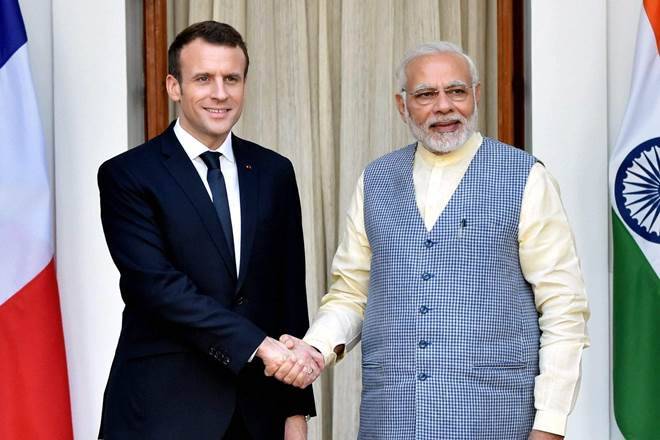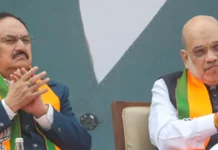PARIS: From one extreme to the other. In India, French Foreign Minister Jean-Yves Le Drian is welcomed with open arms. In Pakistan, France advises its nationals to leave.
Olivier Guillard, in an Asialyst article asks – “Why is the Franco-Indian strategic partnership in full swing, while relations between Paris and Islamabad are at their lowest?
Obviously, the contrast could not be more striking, the difference more spectacular.
This Thursday, April 15, French Foreign Minister Jean-Yves Le Drian completed a three-day trip to India at the invitation of his Indian counterpart S Jaishankar.
While, at the same time, the Ministry for Europe and Foreign Affairs – Quai d’Orsay and the French Embassy in Pakistan urgently sent a message of a completely different nature to the French nationals and to the economic actors present in Pakistan.
“Protests are increasing across the country. In this context, and because of the serious threats to French interests in Pakistan, French nationals are recommended to temporarily leave the country via existing commercial airlines,” the message said.
While the long-time French partner is acclaimed to consider a future of mutual interests in India, a few hundred kilometers to the West, in Pakistan, this same partner is doomed to complaining by a part of the radical population, its ambassador soon persona non grata, wrote Guillard.
This staggering opposition influences the future matrix of relations between Paris and New Delhi and Islamabad: rapprochement and consolidation with the first, distance and downward adjustment with the second, reported Asialyst.
Meanwhile, the Franco-Indian strategic partnership is consolidated through the recent trip by Jean-Yves Le Drian (April 13 to 15).
“This trip testifies to the vitality of the strategic partnership between France and India, which has continued to strengthen despite the health crisis, and illustrates the solidarity between our two countries in the fight against the COVID-19 pandemic,” reported Asialyst.
On the roadmap of the French minister and his Indian interlocutors, at the top of a long and extensive list, was the strengthening of bilateral cooperation and a strategic partnership dating back to 1998, in particular on defense and space and energy.
Also, various international initiatives in which France and India are participating in concert, in the Indo-Pacific region in particular – the opportunity for the Paris envoy to formalize France’s accession to ‘Indo-Pacific Ocean Initiative’ (IPOI) put forward in November 2019 by Indian Prime Minister Narendra Modi.
Finally, bilateral economic and trade relations in innovation and start-ups, in health and biotechnologies, solid and sustained, certainly retain a significant margin for progress between India and France, respectively 6th and 7th largest economies in the world.
Paris is indeed the ninth biggest foreign investor in India, while 120 Indian companies are present on the French market, reported Asialyst.
If the COVID-19 pandemic has left its mark on the course of the Indian stay of Jean-Yves Le Drian – the visit of Prime Minister Narendra Modi in Europe, Portugal and France, in early May will reaffirm how much Paris and New Delhi will remain in 2021 in a logic of proximity – despite the 7,000 km distance, mutual understanding and complementarity, wrote Guillard.
A bilateral matrix diametrically opposed to the one that is disintegrating, at the mercy of eruptions of popular anger – fundamentalist would be more just – repeated, threats and swear words targeting France and its head of state, between Paris and Islamabad.
Already at the end of 2020, supported by a radical Islamist entity, the TLP (Tehreek-e-Labbaik Pakistan), Pakistan was once again the scene of demonstrations hostile to France, to its conception of freedom of expression.
Two weeks earlier, in the wake of declarations by the French president denouncing the excesses of Islamism and its terrorist corollary in France, the developing country in South Asia hosting the second largest Muslim population on the planet had already gathered Islamist crowd’s hostile to French interests in its main urban centers, in Karachi and Islamabad, reported Asialyst.
On November 15, several thousand Islamists responding to the TLP’s call had gathered in Rawalpindi, a neighboring city of the capital, before converging on Faizabad, in the eastern suburbs of the capital, and to reach Islamabad, in order to demonstrate in front of the French embassy. Police and paramilitaries were deployed in large numbers to prevent the feverish protesters from reaching their diplomatic target of the day. Several hundred activists were arrested.
Meanwhile, at the southern end of the country, in the sprawling port city of Karachi, several hundred radical activists from Jaamat-e-Islami, the main Pakistani Islamist party, were similarly rallying to again demonstrate their hostility against France, burning effigies of President Macron.
2021 visibly did little to dampen the wrath of TLP sympathizers towards France. Quite the contrary. At the beginning of the week, the feverish crowds of the TLP again illustrated themselves by mobilizing, in violence.
They demanded from Prime Minister Imran Khan – weakened in his popular legitimacy by a battery of files decried by the public – the expulsion of the French ambassador stationed in Islamabad, designated expiatory victim of the protesters, after the President Emmanuel Macron defended the right to cartoon after the death of teacher Samuel Patty last October.
Anticipating the worst for the local French interests and its representatives, Paris ordered French nationals and companies to leave Pakistan provisionally, in view of the “serious threats” in the country already tormented by a series of internal evils, from terrorism to Islamization, from the socio-economic to the financial, among others.
Seen from Paris, Nice or Bordeaux, these serious and intolerable events will obviously not restore the disastrous image of Pakistan, nor with the French authorities – scalded, and rightly so – even less with the public, wrote Asialyst. (ANI)






